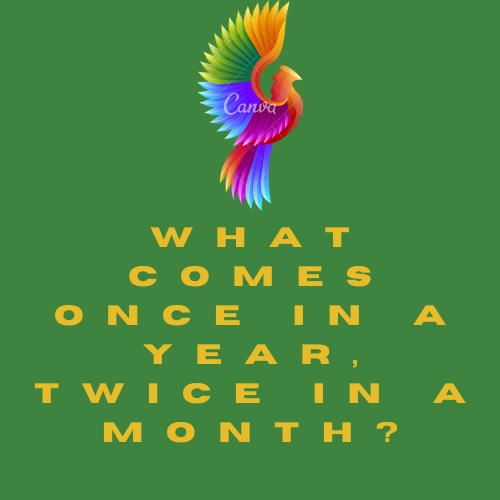Leap years are an interesting part of our calendar. They add an extra day to February, making it 29 days instead of the usual 28. Have you ever wondered why we have leap years and what they’re for? This article will explain the concept of leap years, why February gets an extra day, and various traditions and beliefs associated with this special occurrence.
Answer: The letter R
As, it appears once in a yeaR
Twice in a month, FebRuaRy
Three times in a week: Sunday, Monday, Tuesday, Wednesday, ThuRsday, FRiday, SatuRday
Four times in a day:
One a.m., Two a.m., ThRee a.m., FouR a.m., Five a.m., Six a.m., Seven a.m., Eight a.m., Nine a.m., Ten a.m., Eleven a.m., Twelve p.m. (Noon) &
One p.m., Two p.m., ThRee p.m., FouR p.m., Five p.m., Six p.m., Seven p.m., Eight p.m., Nine p.m., Ten p.m., Eleven p.m., Twelve a.m. (Midnight)
Background
Table of Contents
The concept of a leap year came about because the Earth’s orbit around the Sun takes approximately 365.25 days. To account for this extra fraction of a day, we have leap years every four years. However, this adjustment doesn’t perfectly align the calendar year with the solar year.
What is a Leap Year?
A leap year is a year that can be divided evenly by four. But there’s a rule that makes an exception: years divisible by 100 are not leap years, except if they’re also divisible by 400. This rule helps keep the calendar year more in sync with the solar year.
Why February Has 29 Days in a Leap Year
The ancient Romans decided to add the extra day to February. They chose February because it’s the shortest month. The additional day was believed to help maintain balance in the calendar system and align it with a Roman purification ritual called “Februa,” from which the month takes its name.
Calendars and Leap Years Around the World
Different cultures and civilizations have developed their own calendar systems, each with its own way of incorporating leap years. The Gregorian calendar, introduced by Pope Gregory XIII in 1582, refined the rules for leap years and is now the most widely used calendar system globally.
Leap Year Traditions and Beliefs
Leap years have given rise to various traditions and beliefs worldwide. In some cultures, it’s believed that women can propose marriage to men only during leap years. The legend goes that St. Bridget complained to St. Patrick about the time it took for men to propose. In Greek culture, getting married in a leap year is seen as unlucky.
Fascinating Facts About Leap Years
On February 29th, known as leap day, approximately 1 in 1,461 people are born.
People born on leap day are often called “leaplings” or “leapers.”
In 2016, Taiwan set the Guinness World Record for the largest gathering of people born on
February 29th, with 10,000 leaplings coming together.
In the United States, February 29th is recognized as Rare Disease Day to raise awareness about uncommon medical conditions.
Celebrating Leap Year Birthdays
Those born on February 29th have a unique situation regarding their birthdays. Since they only have a birthday once every four years, they often choose to celebrate on either February 28th or March 1st in non-leap years. Some leaplings even have extravagant “leap day” celebrations when their special day finally arrives.
Conclusion
Leap years provide a fascinating insight into the intricacies of our calendar system. They ensure that our calendars stay relatively aligned with the Earth’s orbit around the Sun. The addition of an extra day to February every four years has given rise to various traditions, beliefs, and celebrations around the world.
FAQs
Q1: How often do leap years occur?
A1: Leap years occur every four years.
Q2: Why does February get an extra day in leap years?
A2: February was chosen because it’s the shortest month and needed the additional day to maintain calendar balance.
Q3: Do all calendar systems have the same number of leap years?
A3: Different calendar systems have their own rules for leap years, but most follow a consistent pattern.
Q4: Can women really propose during leap years?
A4: While not universally practiced, some people believe that women can propose during leap years.
Q5: How likely is it to be born on February 29th?
A5: The chance of being born on February 29th is about 1 in 1,461.

I’m a student. I like writing about famous people. I will cover biography of all the latest and trending people world wide. Stay tuned with me on Biographyly.com. Don’t forget to share our contents with your friends.




